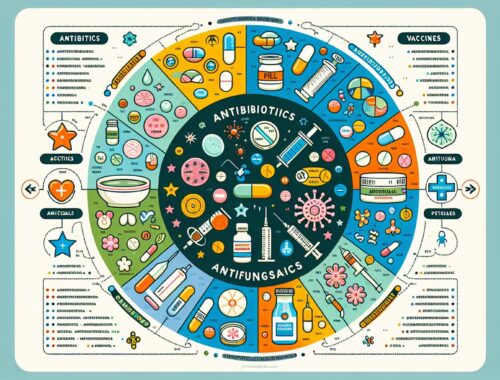
Understanding the Different Types of Medicines
When it comes to maintaining our health and treating various ailments, medicines play a crucial role. From relieving pain to combating infections, medicines help improve our overall well-being. There are different types of medicines available, each serving a specific purpose. Let’s dive into the world of medicines and explore their various categories.
Common Medicines
1. Analgesics:
Analgesics are commonly known as painkillers and are used to alleviate pain. These medications can be further categorized into two types:
-
Non-narcotic analgesics: These are over-the-counter medicines that help relieve mild to moderate pain, such as headaches, muscle aches, or fever. They typically include medications like paracetamol and non-steroidal anti-inflammatory drugs (NSAIDs) like ibuprofen or aspirin.
-
Narcotic analgesics: These are prescribed medications used for severe pain management, such as those related to surgeries or chronic conditions like cancer. However, these medications must be used under medical supervision due to their potential for dependency.
2. Antibiotics:
Antibiotics are prescribed to combat bacterial infections. They work by killing or inhibiting the growth of bacteria. However, it's essential to remember that antibiotics are ineffective against viral infections. Overusing or misusing antibiotics can lead to antibiotic resistance, making it important to take these medications only when prescribed by a healthcare professional.
3. Antivirals:
As the name suggests, antivirals are used to treat viral infections. These medications work differently from antibiotics, as they prevent viruses from reproducing and spreading further within the body. Antivirals are often prescribed for specific viral infections like influenza, herpes, or HIV.
4. Antifungals:
Fungal infections, such as ringworm or athlete's foot, require specialized medications called antifungals. These medications either kill the fungi or inhibit their growth, ultimately clearing the infection. Commonly available as creams, sprays, or oral medications, antifungals help restore the balance between harmful and beneficial fungi present within our bodies.
5. Antacids:
Antacids help neutralize stomach acid, providing relief from conditions like heartburn or acid reflux. By reducing the acidity in the gastrointestinal tract, antacids alleviate discomfort and promote healing. However, antacids should not be used for an extended period without seeking medical advice.
Specialized Medicines
Apart from the commonly used medications mentioned above, there are several specialized medicines available to treat specific conditions. These include:
- Hormones: Hormonal medications regulate various bodily functions by either supplementing or inhibiting specific hormone production. Examples include insulin for diabetes and hormone replacement therapy for menopause.
- Immunosuppressants: These medications suppress the immune system to prevent it from attacking healthy cells and tissues. They are commonly prescribed for autoimmune diseases or organ transplants.
- Steroids: Steroids have potent anti-inflammatory properties and are prescribed to treat conditions such as asthma, allergies, or autoimmune diseases.
- Chemotherapy: Typically used to treat cancer, chemotherapy drugs aim to kill or inhibit the growth of cancer cells within the body.
- Psychotropic medications: These medications help manage mental health conditions like depression, anxiety, or schizophrenia. They can include different classes of drugs, such as antidepressants, anxiolytics, or antipsychotics.
Conclusion
In the vast realm of medicine, it is essential to understand the different types of medications available. From pain management to treating infections, each category serves a unique purpose. However, it is crucial to use medications responsibly and under professional guidance. Remember to always consult a healthcare provider for a proper diagnosis and prescription, ensuring that you are on the right path toward improved health and well-being.
You May Also Like

The Different Types of Medicines
January 2, 2024
Different Types of Medicines
December 21, 2023

